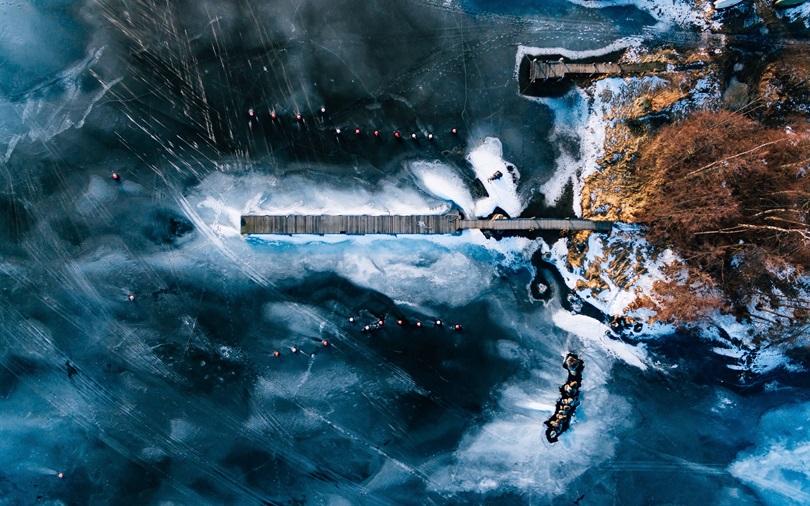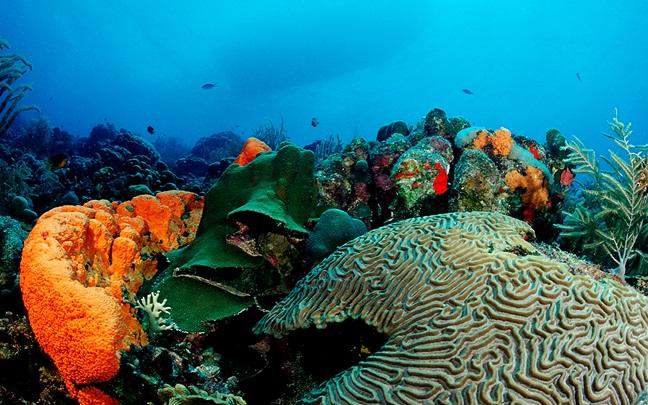WTW attended COP28 in Dubai. Here you can find a snapshot of our activity during the conference. Read our key takeaways here.
“Making NbS approaches viable for multilateral/private sector financing of infrastructure projects” panel hosted by Conservation International, featuring WTW’s Simon Young
This panel will discuss and debate how to accelerate the implementation of nature-based solutions (NbS), including green-gray infrastructure at scale-designing and building the next generation of resilient infrastructure providing biodiversity, adaptation and mitigation benefits. NbS implementation is beginning to gain momentum as practitioners work to overcome some of the major barriers to wide-scale implementation. This panel will discuss and debate several foundational projects as well as how to accelerate the implementation of NbS through innovative approaches.
WTW’s Simon Young championed the potential role that innovative insurance solutions can play in unlocking private capital for adaptation finance and making investments in nature-based solutions more bankable.
Across the world, cities are increasingly suffering from the impacts of intensifying extreme weather events, with urban heat, flooding, and drought-related water stress ranking amongst the top current and future risks. Building on resilient investment and disaster risk management combined with risk financing like parametric insurance, cities can play a key role in reducing the concentrated exposure and vulnerability of people, productive assets, and critical infrastructure.
'Loss and Damage: Challenges and Opportunities for City Leadership', a first-of-its-kind report on the urban dimension of loss and damage by the C40 Cities Network, co-authored by WTW’s Viktoria Seifert, was launched to shed light on the lived experience of cities at the forefront of loss and damage solutions. The press release and report highlight the challenges for local governments in the context of loss and damage and how enhancing city-specific disaster risk financing, analytics, and investment funding could unlock cities’ great potential to contribute to the closing of the disaster protection gap – insights from our work with cities in Central America and Southeast Asia are included.
“Islands of Change: Building Fiscal Resilience in the Face of Climate Crisis” panel hosted by The Government of Antigua and Barbuda, and the International Institute for Environment and Development (IIED)
Small Island Developing States (SIDS) are facing unprecedented challenges due to climate change, experiencing escalating disasters and economic strains. These vulnerabilities, coupled with rising debt levels and limited fiscal space, are hindering their ability to invest in resilience and adapt to an ever-changing climate landscape. The event aims to bring these issues to the forefront, catalysing a dialogue on innovative fiscal strategies and legal empowerment to take SIDS towards resilient prosperity.
WTW’s Simon Young discussed our work on Belize’s resilience wrapper, including the lessons learnt and successes of the first parametric debt protection tool in the context of natural hazards.
“Accelerating Adaptation Investment: Enhancing and Activating the Role of Different Actors” panel hosted by USAID, DFC, and the Climate Works Foundation, featuring WTW’s Simon Young
In support of the President’s Emergency Plan for Adaptation and Resilience (PREPARE), the U.S. government, philanthropic organizations, and the private sector are working together to mobilize additional financing for small businesses addressing climate adaptation and resilience in developing countries around the world. This event will explore the unique tools and experiences different financial actors bring to international climate adaptation work, what has been successful to date, and where to go from here. Participants will learn about new tools and partnership ideas that will help the United States and our partners build a pipeline of bankable adaptation projects.
WTW’s Simon Young discussed the potential that parametric insurance can play to enhance debt resilience and unlock private capital for adaptation.
Alongside the world’s largest multilateral development banks and other international organisations, WTW is proud to support the joint declaration and global task force launched to boost sustainability-linked sovereign financing for nature and climate.
Global public debt is at USD 92 trillion and more than half of all low-income countries at high risk or in debt distress. We look forward to collaborating with the task force offering innovative solutions on reducing borrowing costs for vulnerable countries facing the triple climate, biodiversity and debt crisis.
“The Mangrove Breakthrough - Mobilizing Capital at Scale for Crucial Coastal Ecosystems” panel hosted by The Nature Conservancy, featuring WTW’s Simon Young
The Mangrove Breakthrough is an initiative that aims to halt loss, restore half, double protection, and ensure sustainable finance for mangroves globally by 2030. To achieve its goal of securing the future of 15 million hectares of mangroves, it aims to mobilize $4 billion for investment in these critical coastal ecosystems by the end of the decade. To accelerate progress and address the massive funding gap facing mangroves today, the Mangrove Breakthrough developed a Financial Roadmap – a strategy detailing a toolbox of complementary financial instruments that can rapidly build, prove and scale mangrove-positive investment opportunities as an asset class. This event is a call to action for taking bold steps along the Financial Roadmap to unlock capital at scale for mangrove conservation, which will have a profound impact on the environment and the people who depend on these ecosystems.
WTW’s Simon Young joined the CEOs of The Nature Conservancy and Conservation International, amongst others, at this event about mangroves and the intensive efforts being undertaken by the Mangrove Breakthrough stakeholders to unlock finance to conserve these ecosystems and the services they provide to the benefit of all in nurturing biodiversity, protecting coastlines and sequestering carbon.
At the sidelines of COP, our colleagues met with UNICEF to congratulate them on the outstanding achievements since launching their UNICEF Today and Tomorrow Initiative at COP27 one year ago. WTW's Disaster Risk Finance and Alternative Risk Transfer teams are pleased to support UNICEF in implementing the first child-sensitive cyclone insurance mechanism as its risk advisor, broker and calculation agent, having worked closely with UNICEF and insurers like AXA Climate and the Lloyd's Disaster Risk Facility to efficiently deliver 9 pay-outs totalling $3.9 million to pilot UNICEF Country Offices since the start of insurance cover in January 2023.
We look forward to continuing our work with UNICEF and supporting its Innovative Finance and Climate Resilience Teams in developing the Today and Tomorrow Initiative from a pilot into a platform over the coming years.
“Addressing Loss and Damage and Financial Protection: Best Practice Examples from the Caribbean” panel hosted by CCRIF-SPC, featuring WTW’s Simon Young
The story of natural disasters and their impacts in the Caribbean is well-known. This panel will paint a full picture of the disaster risk financing (DRF) landscape in the Caribbean to share with other regions in the world who may be able to adopt and adapt some of these solutions.
WTW’s Simon Young drew on his experience working on financial protections for disasters in the Caribbean to contribute to this event, alongside Jamaica’s Minister of Finance and CCRIF’s CEO.
“Why do self-interested companies give their vendors climate insurance? Insights from the PSI-managed V20 Sustainable Insurance Facility” panel co-hosted by UNEP PSI, the V20 and featuring WTW’s Viktoria Seifert
Many small and medium-sized enterprises are unprepared for extreme weather. This creates costs to larger companies that rely on them to produce or sell goods, and/or repay loans. Insurance solutions are ready and now it’s a business decision for companies about protecting their supply chains. Co-hosted by the Vulnerable Twenty Group of Ministers of Finance (V20) and the UNEP Principles for Sustainable Insurance (PSI), this session will discuss how banks, manufacturing firms and other companies are making that decision, followed by a discussion with global insurance brokers.
WTW’s Viktoria Seifert shared her insights on the increasing use of insurance to climate-proof supply chains and protect the vulnerable livelihoods of those working in micro, small, and medium-sized enterprises, which are so critical to economic activity.
“Financing ocean climate action and OECMs through innovative approaches” panel hosted by Rare & Ocean Risk and Resilience Alliance (ORRAA), featuring WTW’s Sarah Conway
A showcase of innovative financial solutions that drive capital to locally managed, nature-based solutions like other effective area-based conservation measures (OECMs) to achieve global goals on climate change and biodiversity. A multifaceted approach to financing 30x30 targets for ocean conservation is needed to support community-led management that empowers coastal communities with a strong sense of stewardship to manage their coastal ecosystems with adaptive strategies.
Attendees learnt how parametric insurance can support coastal communities and ocean climate action, with WTW’s Sarah Conway highlighting recent project examples.
“From humanitarian response to recovery – A case for disaster risk finance” panel co-hosted by WTW, ENDA Energie and Mercy Corps, and featuring WTW’s Viktoria Seifert
This session will explore feasible ways in which financing can support disaster risk management across key areas of loss and damage, drawing specifically on the perspective of humanitarian organisations. Looking first at response, the session will draw on community perspectives to highlight the need for problem- not solution-driven approaches, the value of flexible resources for people-centred response, and emerging approaches and challenges with integrating short-term humanitarian relief and longer-term risk reduction efforts.
WTW’s Viktoria Seifert and speakers from UNICEF, Enda Energie, Tetratech, Mercy Corps, and MMC, explored innovations in disaster risk finance for more effective humanitarian responses, faster and better recovery, as well as featuring our disaster risk finance work with UNICEF.
“Forging a Sustainable Future for the Ocean” panel co-hosted by DP World (Principal Pathway Partner to the COP28 Presidency), and the UN Global Compact Ocean Stewardship Coalition, and featuring WTW’s Sarah Conway
The ocean plays a vital role in the global economy, acting as a safeguard of humanity’s most basic needs. All stakeholders must take action to protect the ocean so that it can continue to provide economic resilience. This session will explore the role of insurance in building a pipeline of sustainable ocean economy investments, including what needs to be done to support investment in natural capital assets.
WTW’s Sarah Conway and speakers from Ocean Capital Trust, European Bank for Reconstruction and Development, Sustainalytics and the Saint Lucian Government, discussed what action needs to be taken by key stakeholders to enable multilateral, public-private sector cooperation that ensures a healthy ocean.
“Insurance as a Tool for Enhancing Coastal and Marine Adaptation and Resilience” panel hosted by WTW and featuring WTW’s Sarah Conway
Coastal ecosystems are nature-based solutions for the physical and economic impacts of climate change but are increasingly under pressure from human and climate factors. Innovative risk financing mechanisms such as parametric insurance can provide rapid liquidity for coastal ecosystems or impacted livelihoods so that those affected by climate risks can recover faster and enhance resilience. This session will highlight examples of insurance as a tool for coastal and marine adaptation and resilience.
WTW’s Sarah Conway moderated a panel of experts from organisations deploying risk financing mechanisms for coastal and marine adaptation and resilience.












